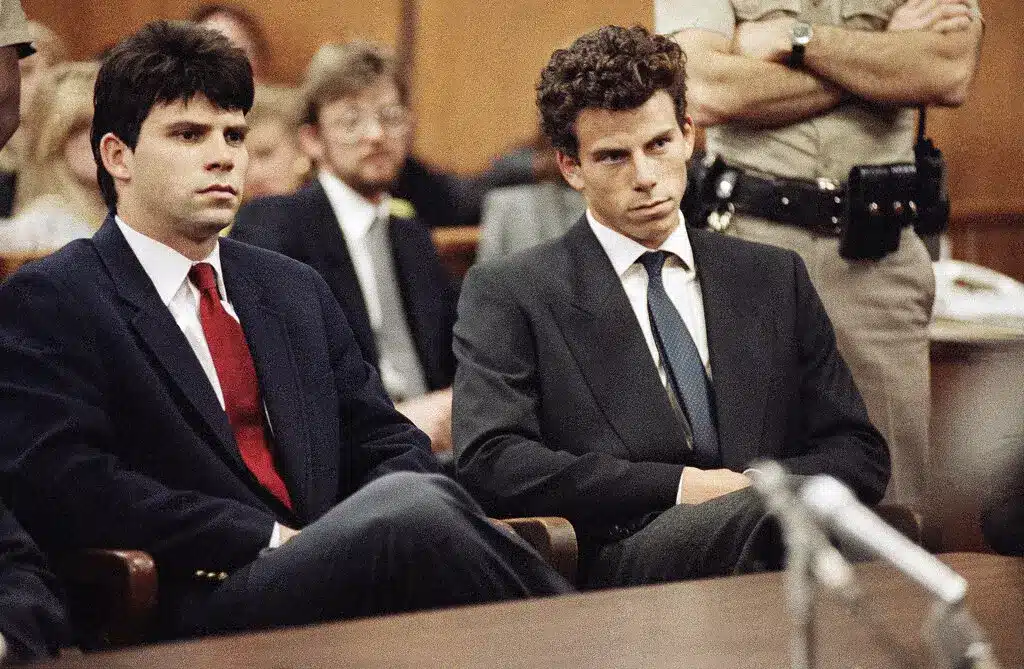The Red Envelope: Billkin and PP Krit’s Take on a Love Story Beyond the Grave
In a cinematic landscape saturated with remakes, reboots and sequels, you might ...

Lyle and Erik Menendez, two brothers born into privilege, tragically took the lives of their parents, entertainment executive Jose Menendez and his wife, Kitty, in their own home.
In the aftermath, the brothers continued with a lavish lifestyle, spending on luxury watches and sports cars, which soon attracted suspicion. The situation began to unravel when Erik ultimately confessed to his therapist.

The trial captivated the nation, especially when the brothers claimed they had endured years of abuse behind the walls of their family mansion. Despite their defence, both were sentenced to life in prison without the possibility of parole.
In recent times, the Menendez brothers’ case has seen a resurgence in public attention, fueled by recent media portrayals that have reignited discussions about male sexual abuse survivors and mental health.
In the 1990s, public reaction to the trials was largely dominated by the sensational nature of the Beverly Hills patricide. Today, modern retellings are driving a deeper conversation about trauma, abuse and the complexities of victimhood, shining a much-needed light on the often-overlooked experiences of male sexual victims.
New Media Spotlight on the Menendez Case
Monsters: The Lyle and Erik Menendez Story (2024)
The Menendez brothers’ case has been reimagined through two distinct lenses in recent media. On one hand Monsters: The Lyle and Erik Menendez Story, the dramatised Netflix series, takes creative liberties with the recorded facts. While it heightens emotional drama to captivate modern audiences, this often leads to exaggerated details for the sake of sensationalism and ratings.

For instance, portraying the brothers as having a sexual relationship—without acknowledging that such behaviour could be rooted in trauma—reduces a deeply complex, personal issue to sensationalism, disregarding expert insights. This approach extends to other controversial elements, such as incest implications and drug use scenes, which are drawn from unproven theories by journalist Dominick Dunne. Even the therapy sessions are dramatised, transforming sensitive moments into scenes designed for shock value rather than understanding.
Monsters sparked controversy when Lyle and Erik Menendez publicly condemned the show’s creators for prioritising ratings over accuracy. Despite drawing over 500 million viewing hours, the series faced backlash for taking creative liberties that the brothers argue harm both them and other male survivors of sexual abuse. They denounced the show, calling the series a “vile” misrepresentation of their lived truth.
The Menendez Brothers (2024)
On the other hand, The Menendez Brothers documentary offers a more intimate look at the infamous case, giving Erik and Lyle Menendez a rare opportunity to share their unfiltered perspectives. This time the brothers speak directly to the audience, giving personal insights into their lives both before and after the tragic events of 1989. The documentary moves beyond the sensationalism that often surrounds their story, allowing the brothers to reflect on their childhood trauma, the murder of their parents and the complex emotions they have lived with since that night. With previously unreleased footage and candid interviews, the series provides a multifaceted view of the case, challenging viewers to reconsider their judgements and better understand the psychological toll on the brothers, as well as the media’s presentation of their trial.
That said, we should approach the documentary’s sympathetic portrayal of the brothers with caution, as it is explicitly designed to present their perspective. While it may offer valuable insights into their claims of abuse, viewers should remain mindful that this is a deliberate narrative choice rather than an objective examination of the case.
Ultimately, despite these flaws, both portrayals contribute to a broader, more complex discussion about trauma, victimhood and the emotional toll of the case. This contrast in presentations raises important questions about how we consume true crime content. They shape public opinion and influence how we engage with real-life stories of violence and pain. While neither is “objectively” flawless, both offer new insights into a case that had previously been reduced to sensational headlines.
Breaking the Silence: Male Sexual Abuse and Mental Health
The recent media attention has highlighted a critical but often overlooked aspect of the case: the particular challenges faced by male survivors of sexual abuse. The brothers’ allegations of abuse, initially met with scepticism in the 1990s, are now being examined through a more informed lens about trauma responses and male victimisation. Several factors contributed to the initial dismissal of the brothers’ claims, rooted in societal attitudes and a limited understanding of trauma.
First, the stigma surrounding male sexual abuse survivors made it difficult for society to accept that men could be victims of such violence, leading to the trivialisation of their experiences. Additionally, the 1990s lacked a deep understanding of trauma responses, particularly in men, as concepts like PTSD were still evolving and not widely applied to male victims.
Also, the brothers’ gender and privileged status added layers of complexity to the case. As men, they faced societal expectations to appear strong and unemotional, making it hard for the public to see them as vulnerable or as victims of abuse. Their wealth and social standing in LA only intensified the scepticism; people struggled to reconcile the idea of privileged young men suffering abuse, especially at the hands of a respected, affluent father. These biases made it easy to dismiss their claims and harder for their narrative to gain sympathy.
Lastly, the media’s focus on the sensational aspects of the case often overshadowed the underlying trauma, preventing a deeper exploration of the emotional and psychological toll on the survivors.
Legal Reckoning and the Road Ahead: Unpacking the Lessons and Lasting Impact
Younger generations more attuned to discussions about mental health and their repercussions have engaged with the case in ways that previous generations did not. This shift in perspective has contributed to increased awareness of male sexual abuse, greater understanding of complex trauma responses, recognition of the long-term effects of childhood abuse and more in-depth discussions about justice and rehabilitation.
The renewed public interest and evolved understanding of trauma have potential implications for the brothers’ legal situation. While they remain incarcerated, the changing social climate, new evidence and greater understanding could influence future legal proceedings.
The most crucial conversation here is about male victims of sexual abuse. As our understanding of mental health evolves, the Menendez brothers’ case encourages us to consider the profound psychological toll on both victims and defendants. It challenges surface-level narratives and urges a compassionate, nuanced approach to trauma, accountability and mental health support within the justice system. While entertainment media often prioritise drama over accuracy, the conversation it ignites has sparked critical awareness.
True justice must extend beyond the courtroom, embracing the full humanity of all involved. It calls for curiosity and healing, prioritising understanding over immediate judgement and punishment.
In a cinematic landscape saturated with remakes, reboots and sequels, you might ...
Find out more about your celeb favourites and their most loved vacation ...
These top 5 barber shops in Bangkok are where gentlemen can elevate ...
While traditional TV shows are serving us endless boy-meets-girl tales. Thailand has ...
Sailorr and Molly Santana’s black grills fuse hip-hop swagger with homage to ...
Netflix Thailand has officially announced a new price for base subscriptions We’ve ...
Wee use cookies to deliver your best experience on our website. By using our website, you consent to our cookies in accordance with our cookies policy and privacy policy